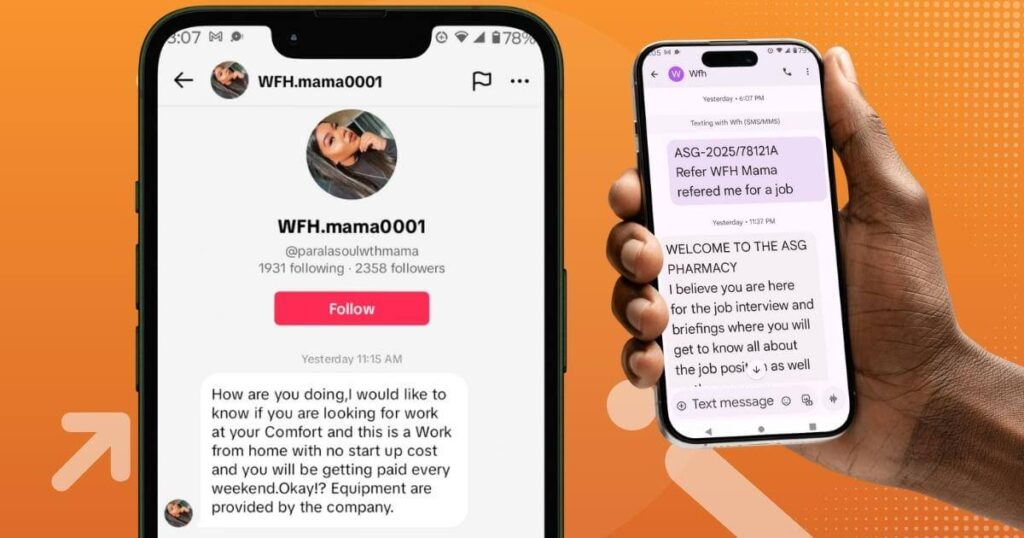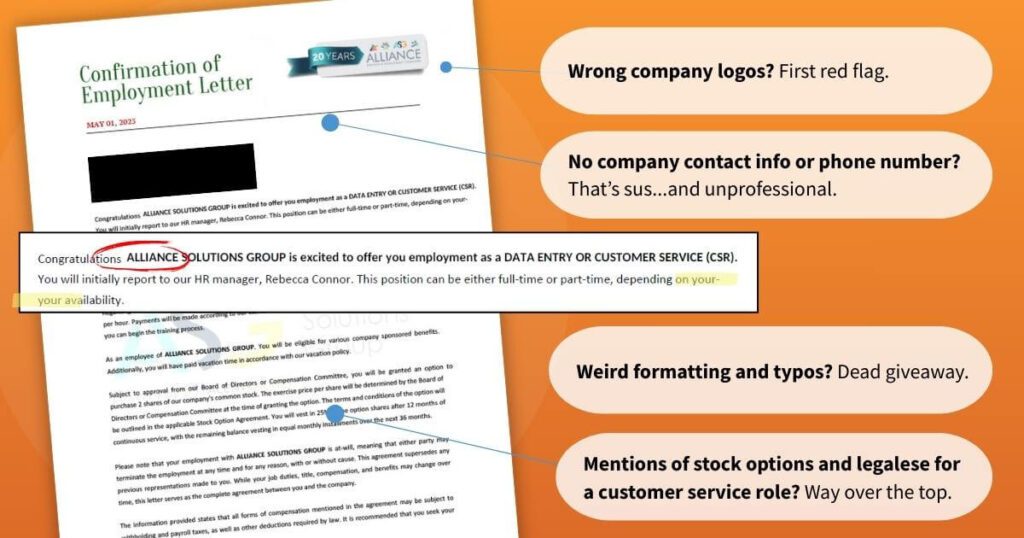Fake Jobs, Real Damage: Someone Posed as Our Recruiter on TikTok
Editor’s note: this article was originally published by TalentLaunch. Stivers is part of the Talentlaunch network of top staffing and recruiting companies.
You know how they say imitation is the sincerest form of flattery? Well friends, it’s not always true.
In the spirit of full transparency, we want to share something that recently happened to us—because it could just as easily happen to you.
A scammer posed as one of our network recruiters from ASG Pharmacy. And they didn’t just fire off a sketchy email or call from a weird number. They went full social mode: slid into a job seeker’s DMs on TikTok, used the name of a former team member, and sent over what looked like a perfectly legit offer letter.
It worked.
The candidate, believing it was real, handed over their Social Security number and banking info.
That job? Fake.
That recruiter? Also fake.
That feeling of betrayal? All too real.
And we hate that.
Because finding a job should feel exciting, not like a trap.
That’s why we’re walking you through exactly what happened, the red flags to watch for, and how to tell when something’s actually coming from us (or any real recruiter). You deserve to feel safe when you’re chasing your next opportunity, and we’re here to help make sure of that.
The New Scam Playground: TikTok and the Rise of “Friendly” Fraudsters
It used to be that job scams came from poorly written emails or obviously fake websites. Now? They come in the form of casual DMs on platforms like WhatsApp, TikTok, Instagram, and even LinkedIn.
Scammers have gotten smart—and social.
They know job seekers are watching “day in the life” videos, following recruiters for advice, and networking through comments and messages. So that’s exactly where they show up.
They copy real recruiters’ names, borrow company logos, and even reference open positions that sound legit (because sometimes, they are pulled from real job boards).
It’s friendly. It’s familiar. And that’s exactly what makes it dangerous.
These scams don’t always look like a red flag. In fact, they often look like a green light:
“We saw your resume and think you’d be a great fit!”
“Here’s an offer—no interview needed!”
“Just need your direct deposit info to get you started.”
When you’re eager for a new opportunity, getting a quick offer feels like a win. But when all communication happens over text or messaging—and you’re asked for sensitive info without even having a conversation with a confirmed human being—it’s time to slow down and double-check.
🚩 Real Messages From Real Scammers
Here’s what a scam looks like in real life, folks.
TikTok DM:
“This is a Work from home with no start up cost… you will be getting paid every weekend. Okay!? Equipment are provided…”
Looks casual and friendly, but it’s vague, rushed, and riddled with grammar issues.
Email:
“Congratulations! You have been selected for employment. Please fill out the attached form and return with your SSN and direct deposit information to begin onboarding.”
Real companies won’t request your SSN or banking details over email, especially not right out of the gate.
Text Message:
“WELCOME TO THE ASG PHARMACY… you are here for the job interview and briefings…”
No company conducts onboarding this way. If there’s no real contact person or phone call, assume it’s not legit.
If you get a message like this and something feels off? Trust your gut. Real recruiters don’t operate like this. More on that below.

How To Spot a Job Scam: Red Flags That Should Make You Hit Pause
Before we dive in, a quick note about texting: Yes, our recruiters do reach out via SMS text, but only after you’ve applied through our official job site and we have your information in our system. If you’re getting a message out of the blue for a company you never applied to? That’s not us. And that’s where the red flags start.
Scammers are getting better, but so are the signs to watch for. Here are a few classic red flags that should make you pump the brakes before handing over anything:
Grammar and Spelling Mistakes
We all make the occasional typo, but if the message is full of awkward phrasing, random capital letters, or strange punctuation? That’s a clue.
Suspicious Email Addresses
Legit recruiters don’t use Gmail, Yahoo, or email handles like no-reply@hiringteam958394.com. You should see a real company domain, like @stivers.com or @mytalentlaunch.com.
Messages at Odd Hours
A message that rolls in at 1:42 a.m. asking for an on-the-spot interview? It’s probably not coming from a real recruiter if they’re not working standard business hours.
Only Communicating Through Text or Messaging
If someone refuses to hop on a phone or video call, or dodges questions about their role or the company? Big nope.
Requests for Sensitive Info Upfront
A legit offer won’t kick off with “Please send us your SSN and bank info”—even if there’s a so-called sign-on bonus involved. That kind of info comes much later during onboarding, and only through secure channels.
Asking for Money
You should never have to pay for equipment, training, background checks, or software as a condition of getting hired.
Pressure to Accept Immediately
Scammers want you to act fast so you don’t have time to think. If someone’s rushing you into a decision or saying the offer will disappear in hours? That’s a tactic, not a real deadline.

How To Know If A Recruiter or Job Offer Is Legit
We know it’s frustrating to have to double-check everything. Ain’t nobody got time for that! But in a world where scammers are pretending to be staffing agencies on social media, a little extra caution can go a long way.
Here’s how to tell when a job—or the person offering it—is actually the real deal:
Check the Company’s Website
If you’re offered a job, go straight to the source.
- Visit the company’s website directly (don’t rely on links in the message).
- Search for the job title or see if the role is listed on their careers page.
- Use the company’s main phone number or contact form to ask if the offer is legit.
If it’s a real job, the company will confirm. And if it’s not? They’ll want to know so they can stop the impersonator.
Look Up the Recruiter on LinkedIn
Most professional recruiters have a LinkedIn presence, and they’re not shy about where they work.
- Look for the company name on their profile.
- Check if they’ve shared recent content or engaged with posts.
- If you’re unsure, message them directly: “Hey, did you reach out to me about this job?” A real recruiter won’t mind you asking.
Ask for a Quick Call
Scammers often avoid verbal communication like a vampire avoids the sun. A five-minute phone or video call is one of the fastest ways to spot a fake and confirm the person you’re talking to is who they say they are.
What To Do If You Think You’ve Been Scammed
First things first: don’t beat yourself up.
Seriously. These scammers are good at what they do. They’re calculated, convincing, and they prey on urgency and trust.
If you got caught in a scam, it doesn’t mean you’re careless—it means someone else was shameless.
Here’s what to do next:
Stop, Block, and Roll
Block the scammer on every platform—TikTok, WhatsApp, email, phone, wherever they reached out. Don’t engage further. Just shut it down and bounce.
Report It
Tell the real company being impersonated (we want to know if someone’s using our name!). Then file a report with:
- Federal Trade Commission (FTC)
- Your state attorney general’s office
- The job board or platform where the scam occurred (e.g., TikTok, Indeed, etc.)
Protect Your Info
Sharing your Social Security number and bank account details with a scammer opens the door to identity theft, drained accounts, credit sabotage, and a whole lot of other financial messes.
If that info’s been shared (even once) it’s time to act fast.
- Contact your bank immediately.
- Freeze your credit if needed through Equifax, Experian, and TransUnion.
- Visit IdentityTheft.gov for a recovery plan.
File a Police Report
It may feel awkward, but having a report on file can help if identity theft or financial loss occurs down the road.
One Last Thing
If you’re ever unsure whether a message, recruiter, or job is legit, just ask. You can reach out to us anytime through our website or LinkedIn page. We’d rather double-check than have someone else take advantage of you.
And to every job seeker out there: we see how hard you’re working. Keep going.
The right job is out there—and it won’t ask for your bank account on day one.
Looking for a legit job?
Stivers is part of TalentLaunch, a nationwide network of staffing and recruiting brands that are 100% verified, 100% human, and 100% committed to helping you find a job that fits.
Whether you’re in customer service, manufacturing, IT, finance, pharmacy—or still figuring it out—we’ve got your back.




